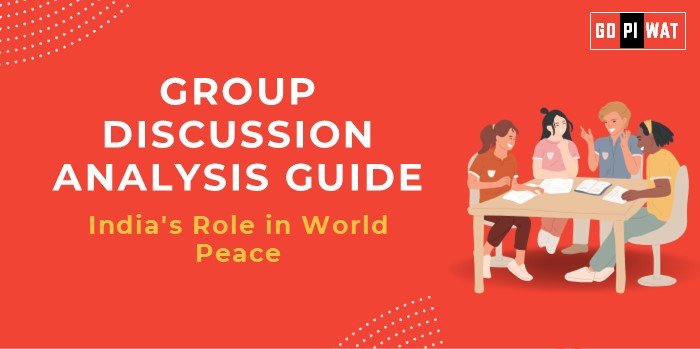📋 Group Discussion (GD) Analysis Guide: India’s Role in World Peace
🌐 Introduction to India’s Role in World Peace
India has consistently positioned itself as a leader in peace-building and conflict resolution on the global stage. Its longstanding policy of non-alignment, diplomatic initiatives, and contributions to peacekeeping missions underline its commitment to global harmony. In recent years, as India’s influence has grown, so has its potential to shape peace-related outcomes in international forums.
📊 Quick Facts and Key Statistics
- 🔹 UN Peacekeeping Missions: India is one of the largest contributors, with over 200,000 troops participating since 1950.
- 🔹 Global Non-Proliferation Treaties: India adheres to non-proliferation values, with a voluntary moratorium on nuclear testing.
- 🔹 Strategic Diplomacy Initiatives: The “Neighborhood First” and “Act East” policies strengthen peace in South and Southeast Asia.
- 🔹 G20 Influence: As the 2023 G20 chair, India focused on multilateralism and sustainable global peace.
🤝 Stakeholders and Their Roles
- 🔹 Government of India: Guides foreign policy, participates in multilateral organizations, and deploys peacekeeping forces.
- 🔹 Indian Armed Forces: Provides extensive support to UN peacekeeping efforts.
- 🔹 United Nations: Partners with India in peacekeeping and humanitarian missions.
- 🔹 Regional Partners: Nations in South Asia (Nepal, Bhutan, Bangladesh) and others are influenced by India’s diplomatic outreach.
🏆 Achievements and ⚠️ Challenges
Achievements
- 🏅 Peacekeeping Contributions: India has contributed significantly to UN missions in conflict zones like Congo, Sudan, and Lebanon.
- 🏅 Mediation in Regional Disputes: Actively involved in facilitating peace talks between conflicting regional entities.
- 🏅 Soft Power Diplomacy: India’s global image as a peaceful, spiritual nation attracts countries to collaborate on peace initiatives.
Challenges
- ⚠️ Geopolitical Tensions: Border disputes with neighboring countries affect India’s neutrality in certain peace efforts.
- ⚠️ Limited Influence in Global Decisions: India’s non-permanent status in the UN Security Council limits its decision-making power.
🌍 Global Comparisons
- 🔍 China: China’s assertive peace-building methods often contrast with India’s non-interference policies.
- 🔍 Norway: Known for mediation, Norway’s approach complements India’s peacekeeping role.
📖 Case Studies
India-Pakistan Relations: India’s restraint and peace talks reflect its commitment to regional peace despite historic tensions.
🗣️ Structured Arguments for Discussion
- ✅ Supporting Stance: “India’s longstanding commitment to peace and non-violence makes it a natural leader in global peacekeeping efforts.”
- ❌ Opposing Stance: “India’s regional conflicts and security issues sometimes undermine its broader peace-building goals.”
- ⚖️ Balanced Perspective: “While India has made substantial contributions to global peace, challenges remain, especially regarding regional conflicts.”
💡 Effective Discussion Approaches
Opening Approaches:
- 📜 “India’s role in global peace can be traced back to its non-aligned movement post-independence…”
- 📜 “As one of the largest contributors to UN peacekeeping missions, India has always prioritized global stability…”
Counter-Argument Handling: Highlight India’s efforts in diffusing regional tensions and its active participation in peacekeeping to refute any argument that its role is limited by regional issues.
🔍 Strategic Analysis of Strengths and Weaknesses
Strengths
- 🔹 High peacekeeping troop contribution, diplomatic influence, moral authority due to Gandhian legacy.
Weaknesses
- 🔹 Limited resources, ongoing regional disputes, restricted influence in international organizations.
Opportunities
- 🔹 Leverage in emerging economies, potential permanent seat in the UNSC, global goodwill.
Threats
- 🔹 Regional power rivalries, threats from non-state actors, strained regional relationships.
🏫 Connecting with B-School Applications
Real-World Applications: Useful for international business and trade policy projects, strategic decision-making models, and ethics courses.
Sample Interview Questions:
- 💬 “How does India’s approach to peacekeeping impact its economic and diplomatic ties?”
- 💬 “What lessons can businesses learn from India’s strategic patience in international conflicts?”
Insights for B-School Students: India’s commitment to peace offers lessons in sustainable conflict resolution, negotiation skills, and resilience, applicable to business scenarios and leadership.


